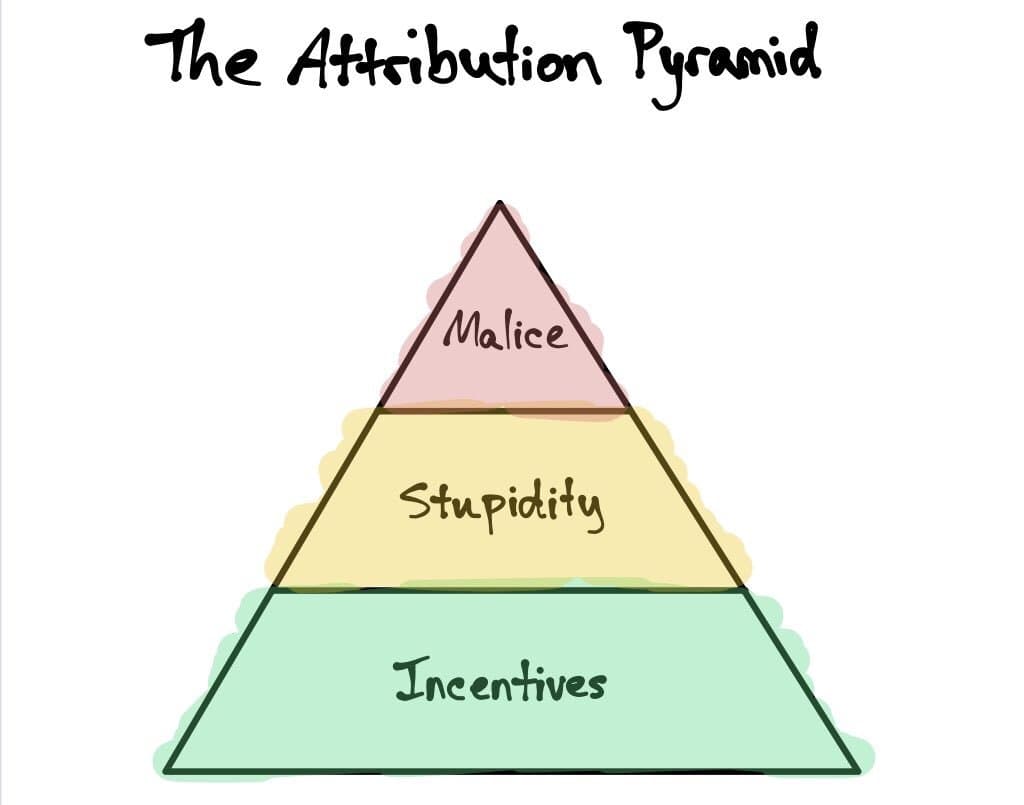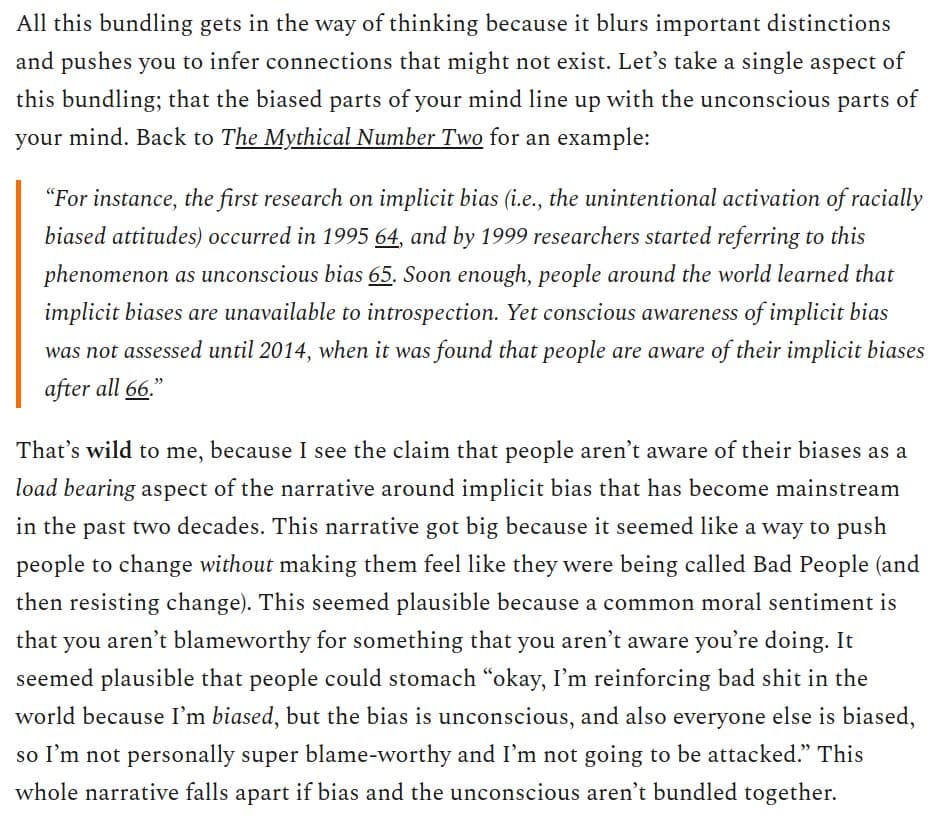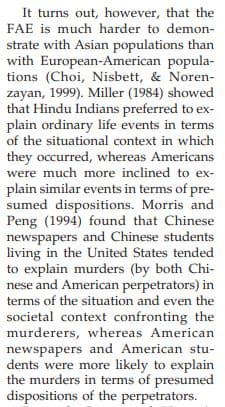🧵 View Thread
🧵 Thread (42 tweets)

gonna share some thoughts on "adversariality". its the thing i see the most confusion about in my circles. put into my mind this morning cuz of rival https://t.co/e2AyzMouKb

Inability to take one's own needs seriously, to tell one own's stories, to not take others' shit onto oneself, to have boundaries - are all frequently the result of enemy (or at least mixed-sum) action. Trying to solve it as an ex nihilo personal defect won't work

it seems like a common way to think about "others causing me harm" is through this pyramid (credit @harmonylion1) many i've talked to identify the key differences as how you should react to each, top to bottom-> "go to war", "education", "systems/institutional design" https://t.co/aB2ig0kr3z


one suspicious thing about the pyramid is the ambiguity about whether it's descriptive or prescriptive. are these claims about the frequency of each? is it better to "treat" something as stupidity, even if it *is* malice?

the pithy "razor" versions of the pyramid are ambiguous in the same was "never attrib to X when you can attrib to Y" why? non-rhetorical, because there could be several different answers and the change the situation A LOT https://t.co/8FcQK2Xamb

a big confusion i see is a cartoonish standard for what counts as "malice" or "trying to cause harm" or for harm to be "intentional" sarah describes it here, also noting that it's a pretty screwy way to think about harm/intention https://t.co/MId9cELgCa

emphasis on *liking* the harm always feels like a red herring to me. even at the extreme end of violent equilibrium (been watching Peaky Blinders, 1920's gang warfare in birmingham) where people premeditate violent acts all the time, sadism is rarely a big causal driver

normally it's business! expanding territory, making money, complying with the logic of blood feuds. there is a strong *disregard* for causing harm, people are very ready to cause harm, but harm is rarely done BECAUSE "i like harming the person i want to harm"

the point of that aside was not "no one *really* wants to cause others harm". that can totally happen! to better shape my point, i'd need to expand on what I think the use of exploring and understanding flavors of intent are

two things you can be doing when talking about adversariality/malice/intent: - threat modeling *as an individual*. what types of people can you encounter? how to best deal, how to protect yourself - standards for group retaliation

zoom out: i want a multiplicity of distinctions! I want carve and craft and explore all sorts of ways of relating to conflict! https://t.co/bY94c6J9ZO

i'm gonna zoom out even more and first look at the dynamics that I think lead to people obscuring useful distinctions in intent/adversariality scapegoating and "kill the infedels" are two classic modes that groups have of handling innner and outer conflict

lots of people i know seem to have done hard oversteering against these modes https://t.co/nvhHXNL9vR

@nosilverv there's also something like, correctly noticing that people saying "XYZ person is Bad and Out To Get Us" is often a precursor to unprincipled punishment, wanting to do something about that, and hard *oversteering* into "no one is ever out to get anyone ever it's all in your head"

my read: A may or may not but trying to scapegoat third party C. Regardless of their intent (lol, notice how B cares about intent so much, but only in specific instances), B interprets all talk of wrong doing as scapegoat move, and tries to block it

i care about much "optimization power" is being put into making shit worse for me. there's endless ways that someone can be low and high-key optimizing (see: "trying") to make shit worse for me that have nothing to do with "liking hurting me" https://t.co/Dk47oF6Trs

emphasis on *liking* the harm always feels like a red herring to me. even at the extreme end of violent equilibrium (been watching Peaky Blinders, 1920's gang warfare in birmingham) where people premeditate violent acts all the time, sadism is rarely a big causal driver

"mistake theory" holds something like "all discussion of wrong doings is attempted scapegoating. That would only be okay if the culprit *liked* causing harm. If that's not the case, then I will shut down conversations about wrong-doing"

hopefully this makes clear that me separating out "optimizing for harm" and "Liking harm" is not me trying to say "get real, no one likes causing others harm" (they exist) my point is there's still plenty to talk about even if the aggressor clearly doesn't "like harming"

k, so one equivocation we've looked at in regards to "trying to cause harm" is - "they like causing harm, main causal motivation" - "they are putting their brain to the task of causing harm" the first is a saddist. the second is someone trying to achieve something through harm

a saddist is different from a mob boss beating the shit out of you so you pay up, is different from someone pick-pocketing to make money "the attribution hierarchy" would lumped these all into malice, which would all be treated like saddism, so we're already gaining resolution!

next course, "intent": in discussions about conflict i normally see people smoosh "intent" into the idea of "pre-meditation". they end up inadvertently saying "there are only two things the mind does, inscrutable unconscious process, and pre-meditation"

it feels weird to talk about why I thing that's not true, because it's so jarringly wrong to me I keep thinking I must be straw-manning people, but these keeps on being how I see people act in conversations about conflict and wrong-doing

first thought: intentional and explict/conscious are not the same thing! when you type, you can do so without consciously commanding your fingers to move, and you also *DON'T* start typing unless you *intend* to type https://t.co/Iae4bJoOuq

there is a difference between the sorts of "intentions" that correspond to "symbolic explicit recordings of a plan of action" and "the mental thing that guides and constrains actions in real time towards local/momentary goals"

imagine A and B, close friends, are arguing intensely. B delivers a scathing insult, and A slaps them and is immediately apologetic and sorry. "shit, i'm so sorry, I don't know what came over me I didn't mean to do that"

there's an important sense in which A might not "have meant" to slap B there's another important sense in which you literally can't slap someone *without* meaning to do so both of those sense are relevant to understanding the conflict between A and B!

another way: slapping someone and then spitting at them is different from slapping them and immediately regretting it "fuck, i didn't mean that", is different from spinning around excitedly not realizing someone was there and hitting them with your hand

my daily life feels dominated by the middle category. the presence of "intent" in the sense of "real time mental thing guiding actions" without the presence of "intent" in the sense of "symbolic recording of aim" the realm of false faces https://t.co/YDfDPGLhC6

here's an example: a friend of mine is incredibly self-judgmental, and also very aware of therapy memes about "don't do that". sometimes he'll end a rant with "yeah, so maybe i'm not the worst person in the world for wanting to be happy" /

/ i'd respond in a smarmy way that was meant to highlight how fucking ridiculous it was that he was previously thinking it would be awful for him to be happy. he'd get pissed an low-key annoyed whenever i did this. once he asked "why do you and [other friend] keep doing that?"

i'd never reflect on this particular dynamic in our convos before, and so i did, and was like "oh, oops, yeah I am in fact intentionally adding extra annoy you flavor to these." when replayed the interaction, there was a clear "shit eating grin" and hehe-gremlin energy/

the point: though i did not have "explicit intent" to annoy, i did have a very real intent to annoy, and it also wasn't "a hidden subconscious motivation". it wasn't hiding, it was right there in the memory of the experience to be replayed and explored

it's just that i never happend to notice, because those interactions had never made me pay attention to what i was intending during them, up till that time my friend made a fuss about it that "failure to notice" is INCREDIBLY different from "hidden impenetrable unconscious"

very related: it seems like pop-psychology is intent on covering up these nuances and distinctions in order to "play nice" with modern structures of blame https://t.co/9MfnwlbjU8 https://t.co/xURn6aaPah


zooming back out: incentives vs malice is supposed to matter because "it's not that *they* want to fuck you over, it's that the system wants to fuck you over, and it's very reasonable of them to go along with the system, so don't retaliate" https://t.co/dTzfGMsk5Q

notice how this hooks into the "this convo must be about who to scapegoat". You categorically can't point group punishment at "people following incentives" because you can't punish/jail/scapegoat your whole population that DOESN'T mean there's nothing *else* you can do!

notice how seeing scapegoating as the only group tool creates pressure to not understand the "causal responsibility" of a situation. if i try to talk to you about ways you're hurting me, you try and silence me cuz "you can't blame me, everyone does it!"

@natural_hazard @harmonylion1 An additional clue: https://t.co/2d1znUDqqj https://t.co/ZngDbZEjdp
